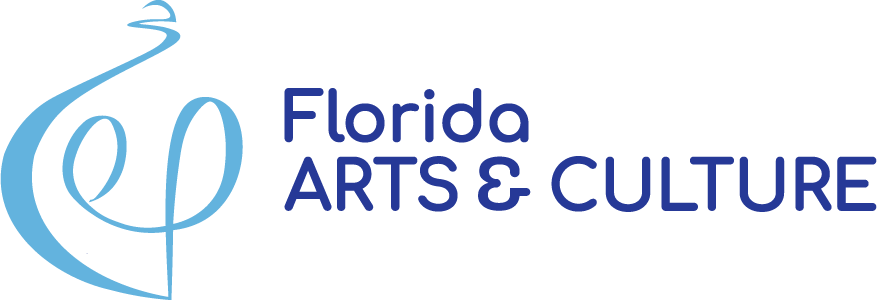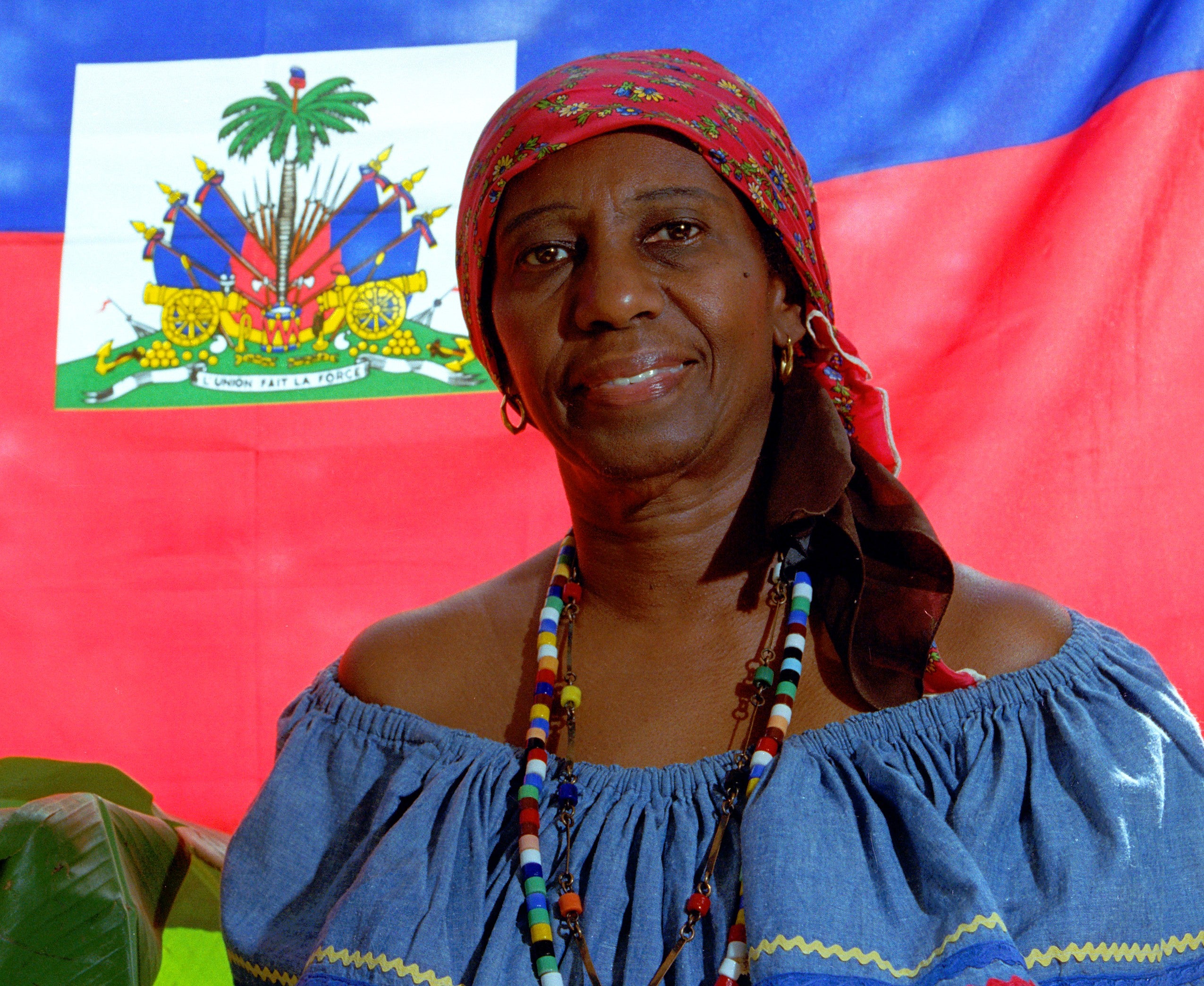
Traditional Artists
Please note: these are performers from 2025. Performers for 2026 will be posted as the festival approaches.
Traditional Artists

Traditional artists at the Florida Folk Festival are sponsored in part by the Florida Department of State's Division of Arts and Culture, the Florida Council on Arts and Culture, and the National Endowment for the Arts. Read below for examples of traditional artists who have appeared at previous festivals.

Just the Way it Was
Liliane Nerette-Louis is a Master Artist who has been promoting Haitian folk life for the past 40 years. She is the author of When Night Falls and other publications including 4 children books such as Pumpkin Soup is for Sunday. She was the recipient of the 2006 Life Achievement award. Louis is committed to continue passing on her rich culture.
Paco and Celia Fonta
Paco and Celia Fonta are internationally recognized performers of Spanish flamenco music and dance, and for over thirty years have been ambassadors of flamenco throughout Florida and the U.S. They are the founders of Siempre Flamenco, a not-for-profit organization that promotes the art of flamenco outside of Spain. They are recipients of the Florida Folk Heritage award and have been recipients of the Florida Folk life Apprenticeship Program as Master Artists. Their performances delight and exhilarate both young and old and the emotions expressed are timeless and universal.
Karibbean Groove
Karibbean Groove is a dynamic six-piece dance band that has been entertaining audiences since 2004 with the sounds of the Caribbean. They specialize in many genres of music including Reggae, Zouk, Merengue, Salsa, Calypso, and Konpa. Karibbean Groove is the perfect blend of professional musicians with musical versatility, vocal harmonies and broad-based audience appeal.
The band has been playing at the hottest night clubs, state festivals, fundraising/community and private/corporate events such as the Reggae Festivals with artists such as Third World, the Florida Folk Festival in White Springs Florida, and the Ronald McDonald House Fundraiser gala, just to name a few.
Karibbean Groove is also well known for being involved in events that highlight diversity, celebrate culture and community empowerment locally and around the world. The band is involved in events with local churches, and non-profit organizations such as Habitat for Humanity, Ronald McDonald House, and Friends Together. Their members also travel to Africa to provide free health clinics to women and children suffering from HIV/AIDS and Haiti to distribute Christmas presents and school supplies to children in need.
Their vision is to infuse everyone with their love for music and culture.
Lili Forbes & The Funky Taters
Expect to hear original music by Lili Forbes and Michael Lewis when Lili Forbes & The Funky ‘Taters take the stage at the Florida Folk Fest. Forbes, along with her twin sister from St. Maarten, have been singing together since they were 12 years old. Growing up with the folk musical traditions of the Caribbean, they soon became expert in many Caribbean rhythms, including gospel, and toured the islands as teenagers. Today they have their own separate musical careers but still compose songs together. The ‘Taters have existed in different mutations since their formation in 2013. Today, they are a nine-piece band with horns that plays danceable funk, jazz, and blues, with an emphasis on New Orleans rhythms. They are led by Michael Lewis, who first began composing songs in 1990. Forbes, who now lives in Tallahassee, and Lewis, from Tallahassee, first came together for a performance at the International Jazz Plaza Festival in Havana, Cuba, in 2019, where they played their originals as well as jazz and pop covers.
Cortadito
Born in the Dominican Republic to Cuban parents, Jose Elias is a musician and arts administrator in Miami. He played with the Grammy-nominated group Conjunto Progresso as well as Miami stalwarts the Spam Allstars before co-founding Cortadito. Cortadito will perform early 20th century Cuban music in the styles of son montuno, guaracha, boleros, nengon and bolero son.
Plena Es
In the Cuban-rich region of South Florida, Plena Es has carved a space for Puerto Rican music by emphasizing the island’s distinctive bomba y plena musical traditions, percussion-driven sounds that reflect the island’s African heritage. Founded by Pierre Ramos in 2004, the band—featuring percussion, trombones, piano, and bass—stirs up a high-energy Latin dance music that is a touchstone for Puerto Rican identity.
Bomba is the 17th-century music created by West African slaves on Puerto Rico’s sugar plantations. Plena mixed bomba with indigenous Taíno Indian music, jibaro music of the island’s mountain farmers, chamber music of the Spanish colonizers and the rhyming verse of urban satirists. The result was often called “el periódico cantado” (“the sung newspaper”), due to the prominence of political commentary and day-to-day news in the lyrics. Backed by the rhythms of the panderos (hand drums), plena focuses on the story, often improvised, sung by a lead singer and chorus. “The bomba was traditionally played in backyards and private parties,” Ramos explains. “These rhythms were considered to be low-class. The plena then went from being played in the streets, to the town plaza, and finally among high-class Puerto Rican people.”
Ramos was inspired upon hearing Los Pleneros del Quinto Olivo as a young boy; he picked up the pandero and found that plena moved him. Shortly after founding Plena Es, Ramos, who also sings, was joined by David Lucca, a conga player originally from Ponce, the region many see as the birthplace of plena. Lucca is now Ramos’s partner in the band. The mission of these pleneros is to get audiences dancing and smiling. “The music is so up-beat and dynamic that it will move anyone that listens to it,” Ramos claims. “The singer’s interpretation and the lyrics telling those amazing stories are nowhere else to be found. The essence of the instruments, when well-performed, creates such a powerful force that it doesn’t matter where you are from, I bet you will move.”
Harmonic Motion
Harmonic Motion Middle Eastern Music and Dance focuses on folkloric forms from Armenia, Arabic countries, Sefarad, and Turkey. Its core performers and teachers are Joe Zeytoonian on oud, darbuka, and voice, and Myriam Eli on darbuka, riqq, dance, and voice. Based in South Florida since 1985, they have performed and taught at many local festivals, concerts, universities, and schools. Mr. Zeytoonian has received various grants and honorable mentions from the Florida Department of State including the 2000 Florida Folk Heritage Award as an Armenian master oud player, as well as Individual Artist Fellowships. He also received an award from the National Endowment for the Arts and the HistoryMiami Museum. Ms. Eli is a 2023 Florida Folk Heritage Award recipient, has received Individual Artist Fellowships and an Apprenticeship as a Master Teacher of Middle Eastern Dance from the Florida Department of State. Mr. Zeytoonian recorded with Gloria Estefan, and they both recorded and performed with Shakira. Ms. Eli was Shakira's dance instructor and choreographer and toured with her. In 2022, Harmonic Motion was Florida Folklife Artist-in-Residence performing at Florida State University, Mission San Luis, and various schools in Tallahassee. Additionally, they have toured the United States, Turkey, Japan, and Latin America.
Isa y el Combo Machete
Isa y el Combo Machete is a Tallahassee-based band. They research and perform a wide range of songwriting traditions from Latin America. Their repertoire includes boleros, cumbias, Cuban sones, Mexican sones, and Andean music.
Papaloko & Loray Mistik
“Mystic Thunder,” is the meaning of Loray Mistik, an exciting group which emanates from the hills and villages of the mysterious, ancient land of Haiti. Their music brings forward the truth of their traditions with rhythms played out on the drums like the sound of the mystic thunder of the Gods.
Vodou speaks to the heart of Haitian people, putting forth a message of social conscience and spiritual strength. It also typifies the music of the Lwa (the Spirits or Orishas) of Africa, with many songs bringing prayers to the 101 Vodou Nations that look over mankind and protect us all. In slavery days, Haiti became a melting pot of African tribes. With the new arrivals many tribal religions blended with a new rhythm created by Don Petwo, a Vodou priest, who combined the attributes of the spirit of Metal, Iron and Justice, Ogun, with Congo rhythms creating Petwo music. Rhythms of the already present Arawak and Taino Indians blended with immigrant African rhythms and the sound of Rara was born. As the popular folk music rooted in Vodou, Rara brought news to the people of the villages and towns and is also played in weddings, funerals, and all social events.
The leader of Loray Mistik, Jude Thegenus, better known as Papaloko, is an artist, whose work is born through trance, the act of falling into a deep meditative state and then being possessed by a spirit whose purpose is to paint strokes of life onto canvas. At about age six, Jude began to study sculpture and ceramics at the Art Institute of Saint Jean Bosco and later completed his education at Lycee Antenor Firmin. Papaloko’s work can be found internationally in galleries, private homes, cafés, restaurants and nightclubs. He is currently putting the final touches on an eighteen-year project at Mango’s Tropical Café on Ocean Drive in South Beach, where he was commissioned to design a tropical atmosphere within the realms of his extreme creative talent.
Loray Mistik performs true Vodou music. Traditional instruments like the kleroon, graj, fe iron, conch shell, cha cha, jon, hand bass, and the drums unify with the eclectic sounds of the guitar, bass and saxophone to create what they call “Vodou pop”. Jude believes that many come to their performances for the spiritual aspect of the music. When Loray Mistik performs it is a much for themselves as is it for the audience. They feel the music first, they never just put on a show.